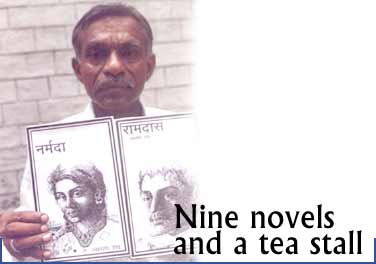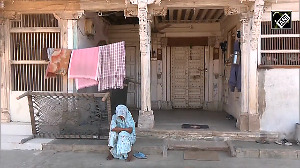
When 17 years later, he managed to stabilise his meagre earnings and pursue writing, disaster struck this paanwala-novelist.
That day in 1999, a Municipal Corporation of Delhi squad took little time to bulldoze his little kiosk -- set up in 1981 with the help of a soft drink firm -- from where he sold paan and tea. They told him it was unauthorised.
Hindi novelist Laxman Rao today sits under a tree opposite Sucheta Bhavan on Vishnu Digambar Marg (previously called Rouse Avenue), near Bahadur Shah Zafar Marg, the capital's Fleet Street, to sell tea on the sidewalk, talk to his devoted clientele and discuss novels.
He has written nine novels, three plays and four more literary efforts are on the way.
"My books are about people, their struggles and triumph. I try to portray my characters as realistically as possible, the way I imagine they will react to a certain situation," he says.
"I have been through a lot of trials myself and hopefully my books will be appreciated by those who are either undergoing or have undergone trying circumstances."
For instance, his novel Narmada is about a girl in rural Madhya Pradesh. It talks about her penury, her long struggle and ends when she is about to enter the bedroom on her wedding night.
Some of his other works include Nai Duniya Ki Nai Kahani, Ramdas, and Patton Ki Sarsarahat.
Way back in 1975, a young man from Maharashtra's Amravati district looked around Vishnu Digambar Marg to set up a paan shop and write novels.
"I just want to keep body and soul together so that I can write," he told anybody who cared to listen.
Some laughed, some thought he was a loony, but most acknowledged that he had intensity of purpose. They could barely stifle their curiosity as he sat under the lamp-post after dusk, writing furiously, his brows furrowed in concentration.
"I am a graduate from Delhi University. My ultimate ambition is to have my books taught in schools. I could have expanded my humble business but I chose to write books and have been rewarded by recognition," he says.
Mrinal Pande, editor of Dainik Hindustan and a writer herself, says she has browsed a few of his books. "His novels are average. What is important is that this man has struggled to write despite his background. You really don't find many such characters today. He deserves all encouragement and help," she says.
 Vishnu Nagar, editor of the Hindi magazine Kadambini, has a similar opinion. "Laxman has tenacity. To have written all these books means he has something in him although you can't push them for outstanding quality. You marvel that our society can produce a hawker whose zest for penmanship outweighs greed," he says.
Vishnu Nagar, editor of the Hindi magazine Kadambini, has a similar opinion. "Laxman has tenacity. To have written all these books means he has something in him although you can't push them for outstanding quality. You marvel that our society can produce a hawker whose zest for penmanship outweighs greed," he says.
Hindi litterateur Rajendra Yadav says Laxman is an inspirational character.
"Had he been a fake, his tryst with his (literary) destiny wouldn't have lasted so long. Here is a person who elicits awe and admiration," he says.
Laxman's novels are piled on a towel under the tree. There is no roof, not even a plastic sheet over his head. What he has are a dozen cups, a well-used aluminium pot and a stove.
"If it rains, I gather my books and scram. I cover the pot and stove. People readily lend me a helping hand," he says.
Today, there are half a dozen concrete kiosks where Laxman's wooden contraption once stood. Those running them sympathise with him as he cheerfully occupies his spot under the tree.
He does not fail to mention that it was the Bharatiya Janata Party government that demolished his tiny kiosk.
"I even met Jagmohanji (then Union urban development and now culture minister), but even his letter did not work," he points out.
Gradually, some MCD officials took pity on Laxman. They told him they would ensure he got a kiosk.
His fondest memory is of meeting then prime minister Indira Gandhi. She encouraged him to write. Thus came his play Pradhan Mantri.
He likes to talk about Ramdas, the name of the novel comes from that of a youth who drowned. While making his way to Delhi, Laxman did odd jobs, but the spectre of Ramdas haunted him.
"His memory inspired me to write my first novel. And I must thank (senior journalist) Usha Rai, who first wrote about me in her newspaper."
After that he became a minor celebrity -- the hawker with literary taste.
He still recalls with gratitude the encouragement given to him by many worthies, including Kamleshwar and Mrinal Pande.
He makes it a point to mention that he publishes his own books.
Today, he lives in tiny accommodation in Shakarpur, east Delhi, hopeful about the future.
His wife Rekha is shy and reluctant to talk. Yet there is pride in her eyes. "Sometimes I think he is crazy. It has been raining since morning but he wants to be near his books. How can he sell tea in the open, now that there is no kiosk?" she asks.
"But he is an upanyaskaar (novelist) and I am happy about that," she smiles.
His two sons, Hitesh, 14, and Paresh, 11, have gone to school.
"I am lucky, fortune has smiled on me. So what if I am a hawker? I must survive in order to write, isn't it?" Laxman laughs.






 © 2025
© 2025